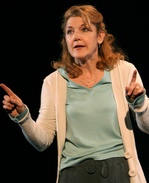SITE GUIDE
SEARCH
REVIEWS
REVIEW ARCHIVES
ADVERTISING AT CURTAINUP
FEATURES
NEWS
Etcetera and
Short Term Listings
LISTINGS
Broadway
Off-Broadway
NYC Restaurants
BOOKS and CDs
OTHER PLACES
Berkshires
London
California
New Jersey
Philadelphia
Elsewhere
QUOTES
TKTS
PLAYWRIGHTS' ALBUMS
LETTERS TO EDITOR
FILM
LINKS
MISCELLANEOUS
Free Updates
Masthead
A CurtainUp Review
Prayer For My Enemy
By Elyse Sommer
|
I'll take the suburbs. Give me banality before brutality. Any day.— Dolores, enraged by a senseless parking ticket by a Manhattan meter maid, a sort of the cap left off the toothpaste once too often moment, that prompted her move back to the small Westchester town where she grew up.
|

Victoria Clark in Prayer for my Enemy
(Photo: Joan Marcus) |
The word dysfunctional has become inseparable from any play tagged as a family drama, but count on Lucas, who's also the author of (among others) Prelude to A Kiss and The Dying Gaul, to put his own stamp on the messy familial and sexual identity issues, exacerbated by a society that fosters substance abuse and alienation.
Ms. Clark, a magnificent singer, is funny and poignant in a straight role that initially seems disconnected from the Noone family's story. In fact, her monologues are high points and feature some of the sharpest dialogue. But while Clark brings sizzle to a play that at times is closer to a simmer, the whole ensemble is very fine and, thanks to Mr. Sher's expert direction and the excellent work of his designers (especially John McDermott's scenery that has no walls and props on rollers that can be unobrusively wheeled on and off stage by the actors and Stephen Strawbridge's clarifying lighting), the movess through various locations and events are staged with a minimum of fussy stagecraft and a maximum of fluidity.
The action takes place in America and Iraq in 2003 and 2004. It begins with an impromptu reunion of the Noone son Billy (Jonathan Groff) and his high school buddy Tad (Zachary Booth), a friendship that was really a first love affair. Billy is about to leave for a tour of duty in Iraq. He joined the reserves in order to at once please and get away from the homophobic putdowns of Austin (Skipp Sudduth) his dad, a disillusioned, bi-polar, alcoholic Vietnam veteran. Tad who married and divorced and has a taste for drugs, has drifted back to his hometown and welcomes Billy's invitation to come to a farewell barbecue in the Noone backyard. There we meet the volatile Austin; Karen (Michele Pawk), the mother desperate to keep peace at any price and clearly only slightly less dysfunctioal than her husband; and Billy's sister Marianne (Cassie Beck) whose hasty marriage ended with a divorce, and an institutionalized autistic child and a return to the unhappy home she sought to escape, Though meeting again has reignited the sexual sparks between Billy and Tad, it apparently does not keep him from being attracted to Karen.
One of Lucas's structural innovations is to take the guesswork out of what the characters are thinking by making them actually voice their inner fears and resentments. While this fits the somewhat enigmatic appearances of Dolores in a fairly traditional fourth wall breaking manner, these segues from what the characters think and say to each other are somewhat overdone and at times confusing. While this internalized dialogue technique is not a Lucas invention (O'Neill first used this technique in Strange Interlude), it does underscore the isolation that defines all these people.
The mystery of Dolores's part in the Noone's story is solved and the rather forced prayer that gives the play its title does hint at the redemptive power of human caring, connection and decency. But, as I already noted, Mr. Lucas, like the two wars that have nurtured so many American tragedies, has not tied up his play like a cheery, neatly wrapped gift box. Life according to Lucas, whether in the city or suburbs, is too messy to be wrapped in tissue paper and neatly tied up with a ribbon.
|
Prayer For My Enemy By Craig Lucas. Directed by Bartlett Sher Cast: Cassie Beck (Marianne), Zachary Booth (Tad), Victoria Clark (Dolores), Jonathan Groff (Billy), Michele Pawk (Karen), Skipp Sudduth (Austin) Scenic design by John McDermott Costume design by Catherine Zuber Lighting design by Stephen Strawbridge Sound design by Scott Lehrer Music by Nico Muhly Stage Manager: Lisa Ann Chernoff; assistant Stage Manager: John Randolph Perry Running Time: 1 hour and 40 minutes without intermission Playwrights Horizons Mainstage 416 West 42nd Street (212) 279-4200 From 11/14/08; opening 12/09/08; closing 12/21/08. Tuesdays through Fridays at 8PM, Saturdays at 2:30 & 8PM and Sundays at 2:30 & 7:30 PM. Tickets are $65 Reviewed by Elyse Sommer 12/05 press preview |
|
REVIEW FEEDBACK Highlight one of the responses below and click "copy" or"CTRL+C"
Paste the highlighted text into the subject line (CTRL+ V): Feel free to add detailed comments in the body of the email. |






